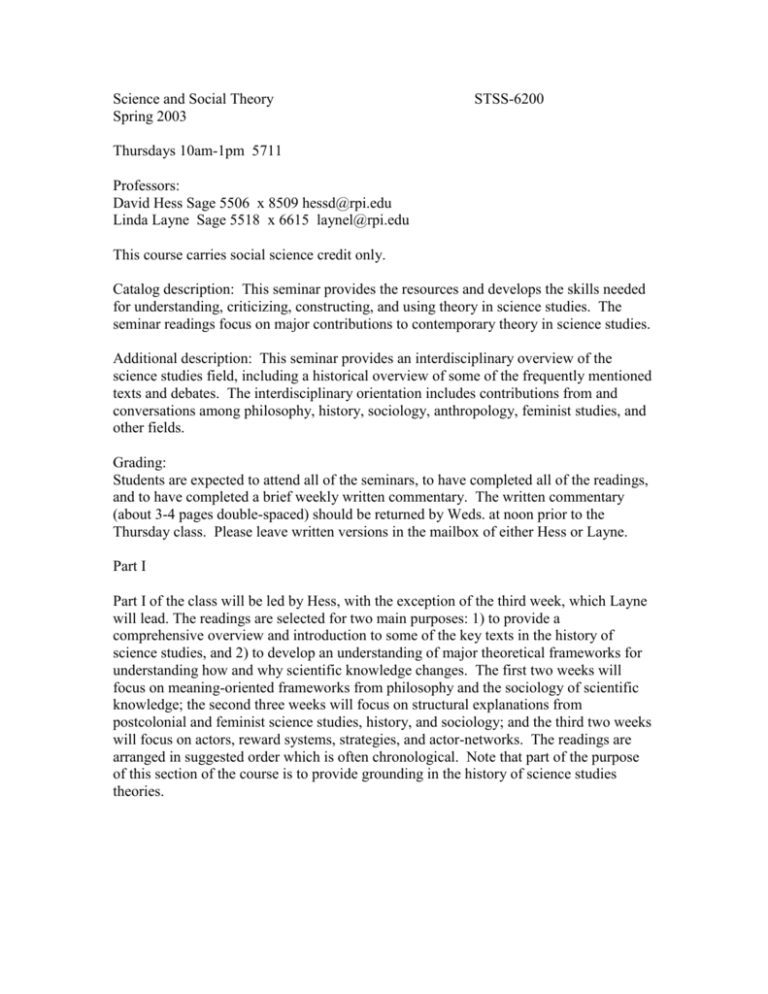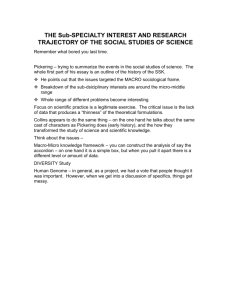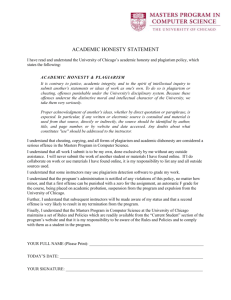Science and Social Theory - Society for Social Studies of Science
advertisement

Science and Social Theory Spring 2003 STSS-6200 Thursdays 10am-1pm 5711 Professors: David Hess Sage 5506 x 8509 hessd@rpi.edu Linda Layne Sage 5518 x 6615 laynel@rpi.edu This course carries social science credit only. Catalog description: This seminar provides the resources and develops the skills needed for understanding, criticizing, constructing, and using theory in science studies. The seminar readings focus on major contributions to contemporary theory in science studies. Additional description: This seminar provides an interdisciplinary overview of the science studies field, including a historical overview of some of the frequently mentioned texts and debates. The interdisciplinary orientation includes contributions from and conversations among philosophy, history, sociology, anthropology, feminist studies, and other fields. Grading: Students are expected to attend all of the seminars, to have completed all of the readings, and to have completed a brief weekly written commentary. The written commentary (about 3-4 pages double-spaced) should be returned by Weds. at noon prior to the Thursday class. Please leave written versions in the mailbox of either Hess or Layne. Part I Part I of the class will be led by Hess, with the exception of the third week, which Layne will lead. The readings are selected for two main purposes: 1) to provide a comprehensive overview and introduction to some of the key texts in the history of science studies, and 2) to develop an understanding of major theoretical frameworks for understanding how and why scientific knowledge changes. The first two weeks will focus on meaning-oriented frameworks from philosophy and the sociology of scientific knowledge; the second three weeks will focus on structural explanations from postcolonial and feminist science studies, history, and sociology; and the third two weeks will focus on actors, reward systems, strategies, and actor-networks. The readings are arranged in suggested order which is often chronological. Note that part of the purpose of this section of the course is to provide grounding in the history of science studies theories. Thursday, Jan. 16 Philosophical Approaches Richard Boyd, “Confirmation, Semantics, and the Interpretation of Scientific Theories.” In Richard Boyd, The Philosophy of Science (Cambridge, Ma.: MIT Press, 1991). Pp. 3-13. Thomas Kuhn, “Ch. 12: The Resolution of Revolutions.” In The Structure of Scientific Revolutions (Chicago: U. Chicago Press, 1996; orig. 1962). Pp. 144-159. Werner Callebaut, Sections 2.1. In Taking the Naturalistic Turn (Chicago: U. Chicago Press, 1993). Pp. 11-19. Imre Lakatos, Pp. 116-138, 154-159. Criticism and the Growth of Knowledge (Cambridge: Cambridge University Press, 1970). Skim 139-153 if you are unable to read it. Thursday, Jan. 23 The Sociology of Scientific Knowledge (SSK) Ludwik Fleck. “Introduction to Thought Collectives.” In Genesis and Development of a Scientific Fact (Chicago: University of Chicago Press, 1979; orig. 1935). Pp. 3851. David Bloor, “The Strong Programme in the Sociology of Knowledge.” In Knowledge and Social Imagery (Chicago: University of Chicago Press 1991, 2nd. Ed.; orig. 1976). Pp. 3-23. Harry Collins, “An Empirical Relativist Programme in the Sociology of Scientific Knowledge.” In Karin Knorr-Cetina and Michael Mulkay (eds.), Science Observed (Beverly Hills, Ca.: Sage, 1983). Pp. 85-113. Harry Collins, “Ch. 4: Detecting Gravitational Radiation: The Experimenters’ Regress.” In Changing Order (Beverly Hills, Ca.: Sage, 1985). Pp. 79-111. Werner Callebaut, “4.3.6 Realism versus Constructivism in the Laboratory.” In Taking the Naturalistic Turn (Chicago: University of Chicago Press, 1993). Pp. 179-185. Star, Susan Leigh, and James R. Griesemer. “Institutional Ecology, ‘Translations,’ and Boundary Objects.” Social Studies of Science 19(1989): 387-420. Thursday, Jan. 30 Gender, Colonialism, and the Scientific Revolution Carolyn Merchant, “Ch. 7: Dominion Over Nature.” In The Death of Nature (San Francisco: Harper and Row, 1990). Pp. 164-190. Londa Schiebinger, “Ch. 5: Battles Over Scholarly Style.” In The Mind Has No Sex? (Cambridge, Ma.: Harvard University Press, 1989). Pp. 119-159. Sandra Harding, “Ch. 3: Voyages of Discovery.” In Is Science Multicultural? (Bloomington, In.: Indiana University Press, 1998). Pp. 39-54. Elizabeth Potter, “Modeling the Gender Politics in Science.” In Nancy Tuana, Feminism and Science (Bloomington, In.: Indiana University Press, 1989). Pp. 132-146. Steven Shapin and Simon Schaffer, “Ch. 1: Understanding Experiment” and “Ch. 8: The Polity of Science: Conclusions.” In Leviathan and the Air Pump. (Princeton: Princeton University Press, 1985). Pp. 3-21 332-334). Donna Haraway, “Ch. 1: Modest_Witness@Second_Millennium.” In Modest_Witness@Second_Millennium (New York: Routledge, 1997). Pp. 23-39. Thursday, Feb. 6 Institutional Approaches to the Origins Problems Bruno Latour, We Have Never Been Modern. Pp. 13-35. Margaret Jacob, “Reflections on the Ideological Meanings of Western Science from Boyle and Newton to the Postmodernists.” History of Science 33 (1995): 333357. Robert Merton, “Ch. 11: The Puritan Spur to Science.” In Sociology of Science (Chicago: University of Chicago Press, 1973; orig. 1938). Pp. 228-253. Boris Hessen, The Social and Economic Roots of Newton’s Principia (New York: Howard Fertig, 1971). Read entire (63 pages). Be sure not to skip part on thermodynamics. Joseph Ben-David. “Ch. 14: Scientific Growth.” In Scientific Growth (Berkeley: University of California Press, 1991). Pp. 299-320. Thursday, Feb. 13 Interests and Institutional Approaches to Contemporary Science Barry Barnes and Donald MacKenzie, “On the Role of Interests in Scientific Change.” In Roy Wallis (ed.), On the Margins of Science (University of Keele, Staffordshire, 1979). Pp. 49-65. Steve Woolgar, “Interests and Explanation in the Social Study of Science.” Social Studies of Science 11(1981): 365-394. Scott Gilbert, “Cellular Politics: Ernest Everett Just, Richard B. Goldschmidt, and the Attempt to Reconcile Embryology and Genetics.” In Ronald Rainger, Keith Benson, and Jane Maienschein (eds.), The American Development of Biology (New Brunswick, N.J.: Rutgers University Press, 1988). Pp. 311-346. Paul Forman, “Behind Quantum Electronics: National Security as the Basis for Physical Research in the United States, 1940-1960. Historical Studies in the Physical Sciences 18.1(1987): 149-229. Daniel Lee Kleinman, “Untangling Context: Understanding a University Laboratory in the Commercial World.” Science, Technology, and Human Values 23.3(1998): 285-314. Thrusday, Feb. 20 Norms, the Reward System, and Scientific Careers Robert Merton, “Ch. 13: The Normative Structure of Science” “Prefatory Note,” “Ch. 14: Priorities in Scientific Discovery” (up to p. 305), “Ch. 20: The Matthew Effect in Science.” In The Sociology of Science (Chicago: University of Chicago Press, 1973: orig. ch. 13: 1942; ch. 14 1957; ch. 20 1968). Pp. 267-305, 439-459. Warren Hagstrom, “The Social Control of Science.” In The Scientific Community (New York: Basic Books, 1965). Pp. 9-47. Michael Mulkay, “Norms and Ideology in Science.” Social Science Information 15.4/5(1976): 637-656. Stephen Cole, “Ch. 7: Is Science Universalistic?” and “Ch. 8: Conceptualizing and Studying Particularism in Science.” In Making Science (Cambridge, Ma.: Harvard University Press, 1992). Pp. 157-205. J. Scott Long and Mary Frank Fox, “Scientific Careers: Universalism and Particularism.” Annual Review of Sociology 21(1995): 45-71. Thursday, Feb. 27 Networks Joseph Ben-David, “Social Factors in the Origins of a New Science.” In Scientific Growth (Berkeley, Ca.: University of California Press, 1991; orig. ca. 1965). Pp. 49-70. Nicholas Mullins, “The Development of a Scientific Specialty.” Minerva 10(1972): 5282. Pierre Bourdieu, “The Specificity of the Scientific Field and the Social Conditions of the Progress of Reason.” Social Science Information 14.6(1975): 19-47. Bruno Latour and Steve Woolgar, “Ch. 5: Cycles of Credit.” In Laboratory Life (Princeton, N.J.: Princeton University Press, 1986; orig. 1979). Pp. 187-233. Bruno Latour, “Ch. 6: Give Me a Laboratory and I will Raise the World.” In Karin Knorr-Cetina and Michael Mulkay (eds.), Science Observed (Beverly Hills, Ca.: Sage, 1983). Pp. 141-170. Michel Callon, “Four Models of the Dynamics of Science.” In Sheila Jasanoff, et al., Handbook of Science and Technology Studies (Beverly Hills, Ca.: Sage, 1995). Pp. 29-63. Especially the 4th model. Academic Honesty Although we have not had any cases of plagiarism in the STS graduate courses, the Institute requires that all syllabi have a complete plagiarism policy, so we are including it here. (The policy may also be helpful to graduate students who will need to develop a plagiarism policy as they begin teaching.) Student-teacher relationships are built on trust. For example, students must trust that teachers have made responsible decisions about the structure and content of the courses they teach, and teachers must trust that the assignments which students turn in are theirs. Acts that violate this trust undermine the educational process. The Rensselaer Handbook of Student Rights and Responsibilities defines various forms of academic dishonesty and procedures for responding to them. In this class, all assignments that are turned in for a grade must represent the student’s own work. In cases where help was received, or teamwork was allowed, a notation on the assignment should indicate with whom you collaborated. If you have any questions concerning this policy before submitting an assignment, please ask for clarification. The following will be considered instances of academic dishonesty: copying a homework assignment, paper, or test answer from another student; recycling one's own or others' papers from other courses; obtaining part or all of a paper from another source other than your own research without providing quotations and citations; direct quotation from printed sources without providing a citation (including rewording or "patchwork plagiarism"); and the use of specific ideas and interpretations of printed sources without citation ("theft of ideas"). Any material that you quote should be placed under quotation marks and cited with a footnote or reference immediately following the quoted portion that provides the source. Do not hide plagiarism by quoting material and then adding a vague reference at the end of the text. You may discuss homework assignments with other students, and you may prepare for tests and class with other students, but the tests and writing assignments should be your own work. If you quote any source or even take ideas from that source, the source should be referenced completely. The penalty for plagiarism can be an F in the course. Copying of class notes: You may make a photocopy of written class notes for friends who have been absent from class for their personal use only. Any wider distribution outside the classroom, such as posting on the Internet or via a list to anyone not in this class, is prohibited and will result in an F in the course. The content of class lectures includes research that Professor Hess is developing for future publications.




